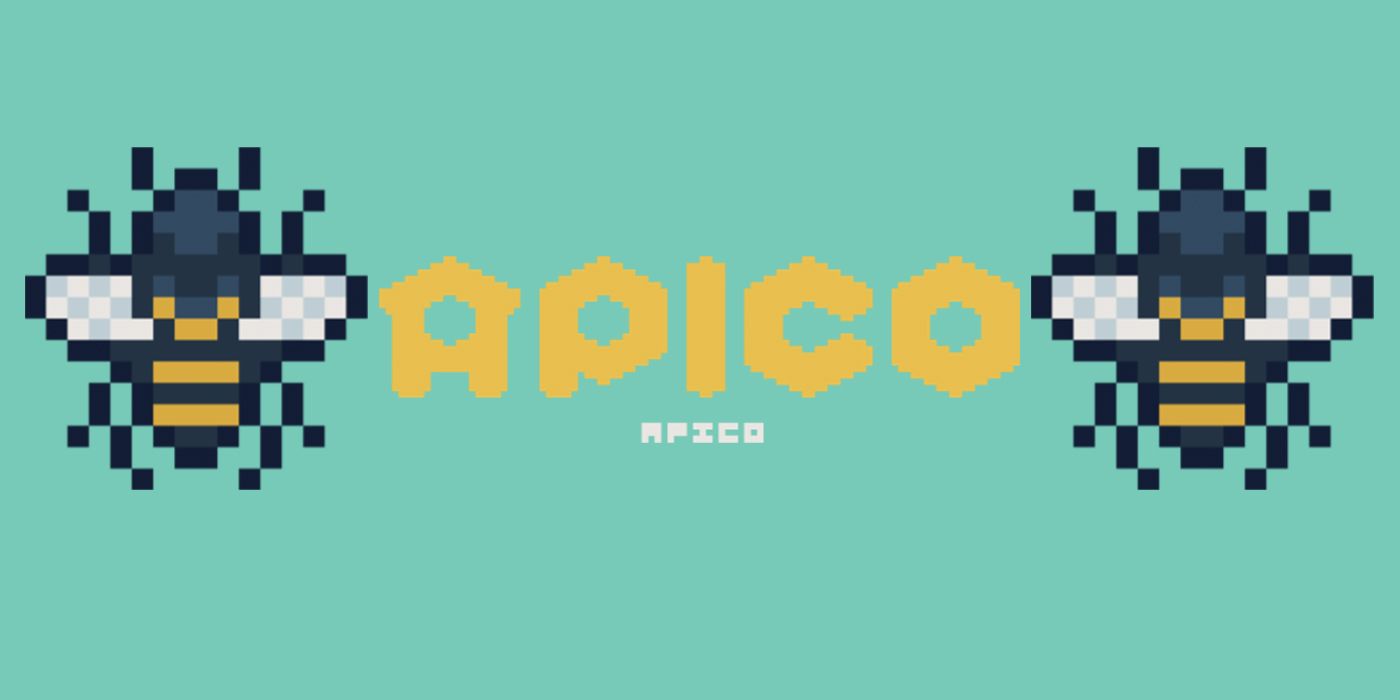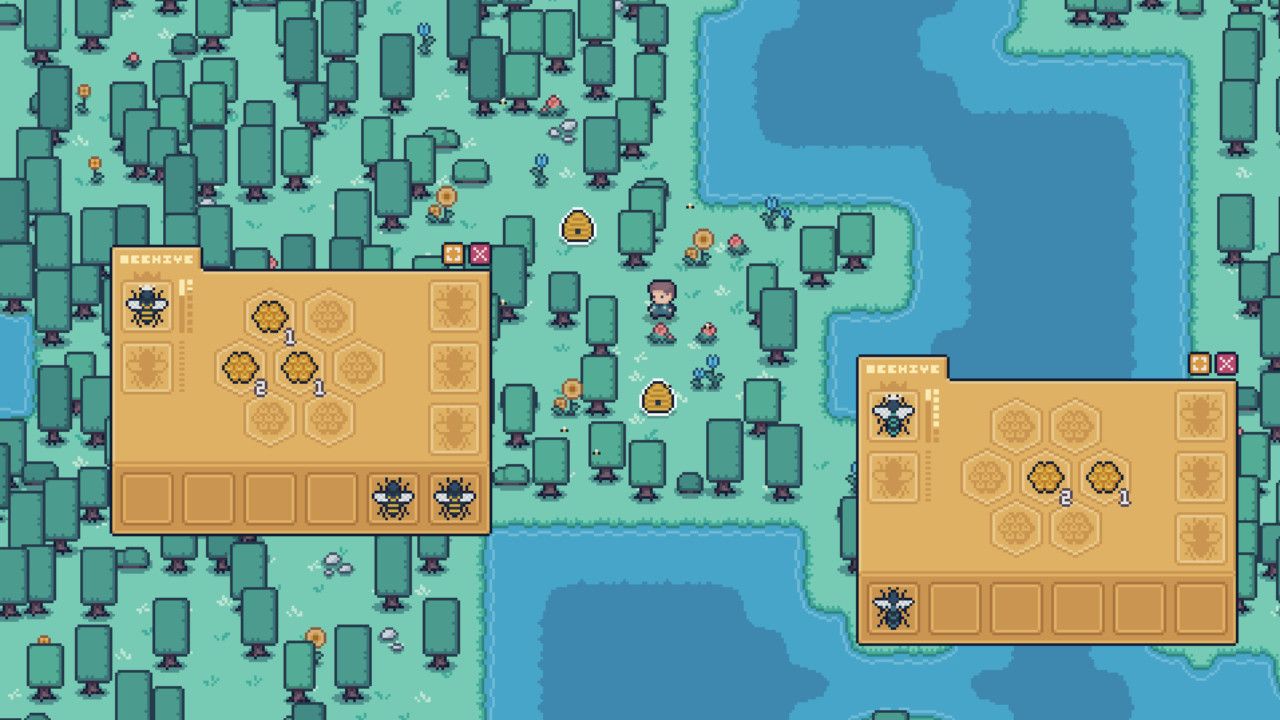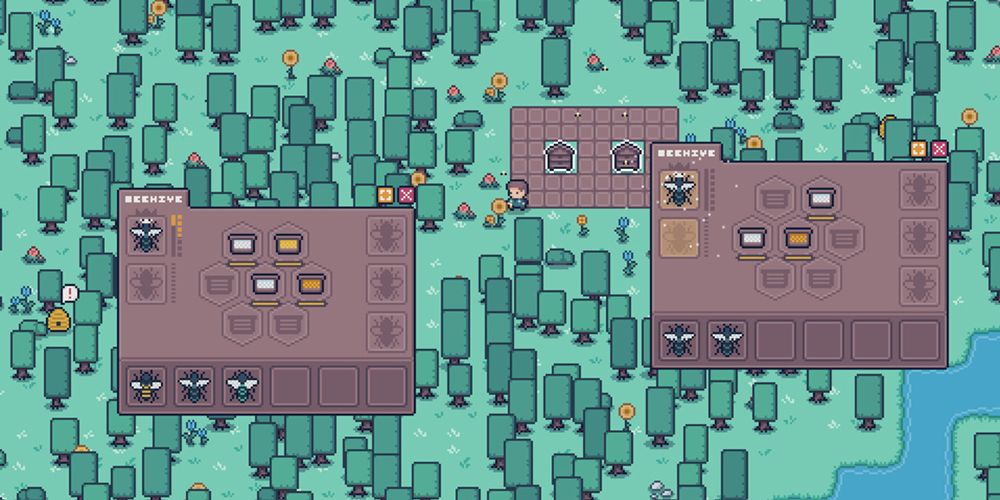Game Rant had the opportunity to sit down with lead Apico developer, Elliott, one of two brothers comprising TNGineers, to discuss their aspirations, influences, and process.
A casual indie beekeeping sim with a cozy aesthetic, Apico is intended to be a comforting, cozy title, and will donate a portion of its proceeds to conservation efforts. The following transcript has been edited for brevity and clarity.
GR: Can you give us a brief introduction to Apico?
Elliott: So, Apico is a casual sim game about breeding, collecting, and conserving bees. We played a lot of old school modded Minecraft, before the game officially added bees. And along the way, we thought “this could be a whole game.”
GR: How did you capture the essence of beekeeping with mechanics?
E: It’s mostly collecting bees. We have this crossbreeding system that essentially works like Punnett Squares where you can mix and match different species to unlock new bees.
Another thing that was important was crafting. Lots of games have crafting systems where you just click a button and make something. We wanted to be more active than that, so there are various… “machines,” or tools that have little mechanics you need to complete to produce things, like squeezing the honey out of hive frames, or sawing logs by dragging your mouse.
At the end we go a bit nuts. There are machines that run on the power of bees, so the fantasy of it kind of comes forward. You can have your crafting tool windows all open at once; like the craft windows in Terraria, Starbound, and Minecraft.
GR: How many different types of bees does the game feature, and how do they vary mechanically?
E: It’s kinda just “you gotta catch ‘em all.” I wanted to have it so the conditions to get new species are very varied. I didn’t want it to just be dice rolling on end to see what you get. For instance, there’s one bee that you can only breed while the player character is sleeping. There is another bee, the Ancient Bee, that you can only breed from an extremely long-lived species. We put them into tiers—though I don’t think that’s in the game yet—and there are about 30 species available from cross-breeding.
But we will probably add some seasonal bees, like for Halloween, Christmas, and so on. I think I’ll just keep adding new ones until I get bored of it. We also wanted to have “shiny bees,” like shiny Pokemon. So, you know, there are rarer alternate colors for every bee type.
GR: The Game’s Steam listing invites players to “get cozy,” with Apico. Can you tell us a bit about what that means?
E: There are a lot of good dark and gritty games, like you know, Blasphemous or Bloodborne and so on, but in Minecraft, Terraria, and StarBound... there’s just such a nice mood, especially paired with the serene music. I’ve found that when you come home from a long day at work, it’s a great way to relax.
GR: Did the current events surrounding bees, like colony collapse and bees dying off affect or drive development in any way?
E: Not really, it just kind of came about. I mean, I’ve always loved bees. I was in favor of conservation efforts when the whole colony collapse scare came about. I remember when people were invited to head out to vandalize their local parks with these flower seed bombs that would attract bees, and I was like “Yeah, save the bees!” But that wasn’t what drove it. In the course of working on it, I realized it would be a very good platform for education. That said, we don’t want to be in people’s face with politics.
GR: So even though you aren’t trying to preach to players, Apico is a game with a message. Do you think more games would benefit from that?
E: It’s kind of a joke with these indie games, that the first step is always deforesting the world. I think there’s definitely some fun stuff to be had in doing things the other way around. That said, we have a sort of system with achievements at both ends of conservation. Like, we track how many trees you chop down. But it’s not really good vs. evil, we don’t want the player to feel like we’re “watching” them and again, you can’t lose or die, but actions have consequences.
GR: It seems like there has been a greater appetite for wholesome content, Cottagecore, and 'comfort games' as of late. Do you think this is a reflection of current events, or a trend that will continue to endure?
E: I think it’s a bit of both. Part of it is the world being, you know, sh*t at the moment, so what better to do then go back to your grand dad’s farm and bring things back to life, or build a delightful village on an island and spend time with nice characters. Outside Animal Crossing, you see less of that in AAA development, but the indie market for those types of games is getting bigger every year.
GR: Does Apico feature a narrative? If so, can you give an idea of what players can expect?
E: We have a story. It kind of develops the way games always do, as I have learned from talking to other devs. You come up with an idea, and sort of iterate as you go. See what works and what doesn’t.
Basically, you get a postcard from your nan, inviting you back to your family home on Apico, which is the name of the archipelago where the game takes place. You’re one of the Keeper family—we were really on the nose with that one—and you go back to your old family home. You hate your office job and quit to go learn the art of beekeeping. The game has a lot of text, as the story is sort of framed around a journal. My brother and I have been injecting a lot of our own humor in there, which people seem to appreciate so far.
There’s also a grumpy old man who believes beekeeping is strictly a science, whereas other characters have a more spiritual or religious connection to the bees. And this old man sees people praying to their altars and thinks they are backwards. So there’s a little bit of that dynamic in there.
My brother also insisted on a “Lost Bee” quest, so that’s in there too.
GR: How did you settle on the look of Apico?
E: That was quite a hard one. This is our first game. I’ve been a developer for years, but the art is always hard. Eventually, I just had to accept that I can’t draw trees. Everybody always uses those fat Legend of Zelda trees, and I didn’t want to do that. I just made a square, called it a tree and it kind of stuck. So everything’s based around me not being able to draw trees. We’re just winging it, really.
In terms of the palette, I wanted to pick some interesting colors like mint green and purple brown. Again, we wanted something very soothing. It’s funny actually, on Twitter, I posted a picture of something I was working on, and I got called out for stealing from Apico. And I had to explain, “No, that’s my game. I’m working on Apico.” And it’s nice actually, to know people have some familiarity with it.
GR: After launching Apico, what is next for TNgineers? Is there any post-launch content planned, or are you moving onto another title?
E: Yeah there’s a few different things. We signed with Whitehorn Digital which is known for being a wholesome game publisher. And the main reason we went with a publisher is so we could get the game on consoles—because I really want to play it on the Switch. [Laughing] I don’t really care if other people aren’t interested—that’s for me. Though, I understand the console approval process can be difficult and take a long time, so we wanted to work with a publisher.
In terms of adding content, we were thinking of flower buffs for certain types of bee, or adding butterfly collecting so people have something else to seek out. And one of my friends said they would never speak to me again if the game doesn’t feature fishing. So I guess that’s going in at some point.
Apico is our first one, it’s our baby, but there’s definitely some ideas for new games. We’re thinking of a game that is like Factorio meets Satisfactory but cute, and about food.
GR: Has community feedback been very important in Apico’s development?
E: We did a small alpha before we moved the engine. Personally, I have never played Stardew Valley—I’ll probably be attacked for this—but we got a lot of different ideas from different kinds of people playing the game in different ways. I just make a mess in the forest, try to get all the bees as quick as I can. But another player built mined all the rocks on the starting island and built this mansion, because that's what he wanted to do. He just wanted to live in his bee mansion with bee gardens, and strip-mined the world to do it. So we got a lot of feedback from that which helped us refine the systems.
GR: Can you tell us about your team?
E: It’s just me and my brother, Jamie. I’ve done design projects in my career before this, so that part of it wasn’t hard. I do the development and most of the pixel art while Jaime does most of the writing. And then we’re working with Brodux for the music.
The music is inspired by the sort of soft piano and melodies in Minecraft. It was very important for us to get that to establish the mood. I could probably do a beep-boop tune myself, but that wouldn’t really fit. To get that relaxing, serene feel, we wanted to turn to somebody who really knows what they’re doing. When I found a track on Brodux’s SoundCloud, I thought “that’s it.”
GR: Is there anything else you’d like to share with readers about Apico?
E: We just moved the game to GameMaker Studio for the console ports. Very soon we’ll have a new shiny demo out. Our official publisher release is early January of 2022, I believe, but we want to be done by August or September of this year. I’m hoping to have an early access period sometime in the fall, just so I can call it an “Open Beeta,” because, how could you pass up that opportunity?
[End.]



